新概念基础Lessons 5
新概念英语 New Concept English Lesson5
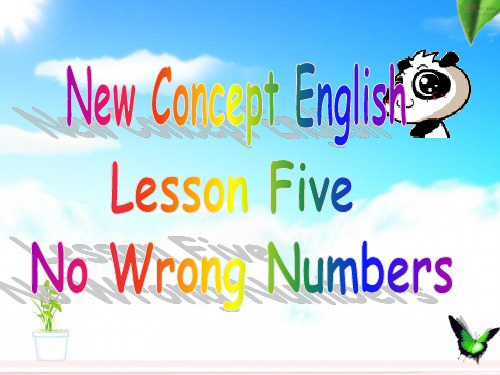
Checkpoints
1.other/ another 别的,其它的 One……the other…… 一个……另一个…… (两者间) I have two brothers One is 16, the other is 12. One……another…… 一个……..另一个…… (三者以上) I don’t like this one, show me another. This book is too difficult for me .would you please show me
•
• • •
• • •
4. a great many = a great number of + 可数 名词复数 I have been to the city a great many times. He has worked here for a great many years. A great number of people have come to the party. a number of 许多,大量/ the number of……数字 A number of children are playing on the grass. The number of students in this class is 40.
• • • • • • • • • • • •
6. spare adj. 多余的,空闲的,备用的 spare parts配件 spare tire备胎 spare key 备用钥匙 spare time 空闲时间 = extra time spare money零钱 If you have a spare bed, may I stay tonight? 如果你有空床,今晚我可以留在这儿吗? Have you any spare time to help me? 你有时间帮帮我吗? v.饶恕,宽容 Please spare me!= Please don’t kill me.请别杀我! • They killed all the men but spared the children. • 他们杀了所有的男人却放过了孩子。
(完整版)新概念第一册Lessons51-60课课练答案(全)

Lessons 51-52二、填寫單詞所缺字母1、October 6、climate2、spring 7、pleasant3、December 8、autumn4、winter 9、February5、summer 10、weather三、根據句意和首寫字母完成下列句子1、It’s always warm in April and May, but it rains sometimes.2、It’s often cold in December, January and February. It snows sometimes.3、They’re English. They come from England.4、He’s Greek. He comes from Greece.5、We’re French. We come from France.6、She’s Dutch. She comes from Holland.7、You’re German. You’re from Germany.8、I’m Norwegian. I come from Norway.9、They’re Swedish. They come from Sweden.10、He’s Spanish. He comes from Spain..四、用所給詞の適當形式填空1、We like (like) English very much.2、Jim comes (come) from England.3、Does she want (want) any meat?4、They don’t come (come) from Japan.5、It doesn’t rain (rain) in winter.6、Can you see (see) some birds in the sky?7、He is sitting (sit) on the grass.8、Can you make (make) biscuits?9、Are they working (work) hard?10、She isn’t reading (read) a magazine.五、改錯1、Do you want milk and coffee?and——or2、I don’t like steak, too.too——either3、My brother like beef.like——likes4、T o telling you the truth, he doesn’t like chicken.telling——tell5、It don’t rain in winter.don’t——doesn’t6、Do he come from England?Do——Does7、-What does it like in summer?-It’s hot.does——is8、Is it cold and warm in autumn?and——or9、She doesn’t likes the winter.likes——like10、I comes from China.comes——come六、完成句子1、春天の天氣怎麼樣?What is the weather like in spring?2、他也不喜歡牛肉。
新概念英语第一册第五课ppt课件

Chinese
18
Fill in the blanks 2
Good
Good Nice to meet you. MR. BLAKE: ____Tmhoisrning.
STUDENTS: ____morning, Mr.nBelwake.
MR. BLAKE: ___is Miss Sophie Dupont. Sophie is a ___ studetnhtis. She is French.
Q1: What’s the name of the new student? Q2: How do we greet strangers? Q3: How many students in the class?Who
are they?
13
Phrases
Nice to meet you. Nice to meet you, too .
9
New words
student nice meet too
/5stju:dEnt/ /naIs/ /mi:t/ /tu:/
n.学生 adj.愉快的 v.遇见 adv.也
10
French German Japanese Chinese Korean
New words /frentF/
/5dVE:mEn/ /dVAp5ni:z/ /7tFaI5ni:z/ /kE5rIEn/
MR. BLAKE: This is ____ Sophie Dupont. Sophie is a newG_e_r_m_a_n_.She is ______. MR. BLAKE: Sophie, this is Hans. He is ______.
HANS:
Nice to meet you.
新概念第五课
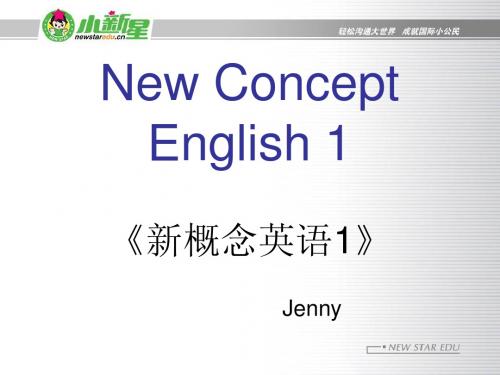
第五课课文讲解 nice
• Good morning. 早上好 那么下午好和晚上好还记得怎么说吗? Good afternoon. Good evening. • This is... 这个句型不仅可以说这是我的...还可以用来 介绍人。 eg:This is my friend, XXX.
我是哪国人?
• 在说自己是哪一个国家的人时,使用句型: I’m...... 例如:I'm Chinese. • 用以下单词来做一个替换练习吧! French,German,Japanese,Korean, Italian,American,Swedish,English
五. Chant :
主格代词顺口溜:
我是I ,你是You ;
Lesson 6 What make is it?
• 这句话中的make是名词词性,意思是 产品牌号。 所以这句话的意思是:它是什么牌子 的? 回答:It's a... • 这句话中的it是代词,这个位置也可以 用其他的名词 例如:What make is this pen?
来做些练习吧~!
• -What make is your...... -It's a... 运用以上模板来做替换练习: watch,Swatch;telephone,Nokia; computer,Think Pad;coat,Only; television,Sony;chocolate,Dave; handbag,LV;ring,Jaff; handcream,Olay
男他He ,女她She ,动物的它是It; 我们We ,你们You ,他们They. Who are you ?
Exercise
• 见课本P12
不定冠词a
新概念第五课

Lesson 5 No wrong numbers 无错号之虞Pigeon – n. 鸽子Message – n. 信息,口信【搭】leave sb. a message 给某人留一个口信(打电话用语):May I leave my father a message?我能给我父亲留个口信?Take a message for / to sb. 给某人捎一个口信?(经常用在口语中):——Could you take a message for me? 你能为我捎个口信吗?——Yes, I can take a message for you. 好的,我能为你捎个口信。
【辨】message,information,news,communicationMessage“信息”,可是名词:a message 一条信息;information “信息”,不可数名词:a piece/ bit of information 一条信息;a message 一条信息;information “信息”,不可数名词:a piece / bit of information 一条信息;news“消息”,不可数名词:a piece/ bit of news 一条消息;communication “通信,联络“,指一般的交流。
Cover – v. 覆盖;走过,越过;监视:The ground is covered with leaves. 地面被树叶覆盖着。
/ The police are covering all exits out of town. 警察已监视住出城的所有出口。
n. 封面;盖子:cover girl 封面女郎;bowl cover杯盖distance – n. 距离;远方:distance call 长途电话;keep sb. at a distance 与某人保持一段距离【补充学习】部分名词去词尾ce加t 变成形容词:Distance去ce+t = distant 遥远的Importance去ce+t= important重要的Request – n. 要求【搭】have a request for : 需求,对……有请求:The beggar had a request for some rice. 乞丐要了点饭吃。
新概念英语第5课
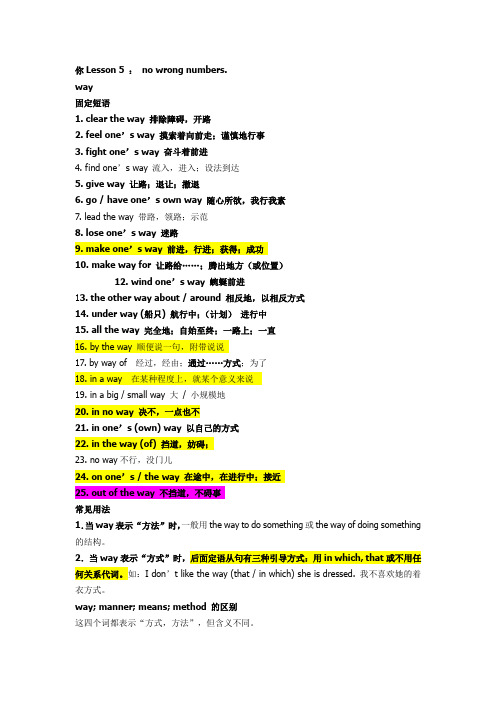
你Lesson 5 :no wrong numbers.way固定短语1. clear the way 排除障碍,开路2. feel one’s way 摸索着向前走;谨慎地行事3. fight one’s way 奋斗着前进4. find one’s way 流入,进入;设法到达5. give way 让路;退让;撤退6. go / have one’s own way 随心所欲,我行我素7. lead the way 带路,领路;示范8. lose one’s way 迷路9. make one’s way 前进,行进;获得;成功10. make way for 让路给……;腾出地方(或位置)12. wind one’s way 蜿蜒前进13. the other way about / around 相反地,以相反方式14. under way (船只) 航行中;(计划)进行中15. all the way 完全地;自始至终;一路上;一直16. by the way 顺便说一句,附带说说17. by way of 经过,经由;通过……方式;为了18. in a way 在某种程度上,就某个意义来说19. in a big / small way 大/ 小规模地20. in no way 决不,一点也不21. in one’s (own) way 以自己的方式22. in the way (of) 挡道,妨碍;23. no way不行,没门儿24. on one’s / the way 在途中,在进行中;接近25. out of the way 不挡道,不碍事常见用法1.当way表示“方法”时,一般用the way to do something或the way of doing something 的结构。
2.当way表示“方式”时,后面定语从句有三种引导方式:用in which, that或不用任何关系代词。
新概念英语第三册-Lesson5

Company Logo
Exercise
中国的父母们常常不遗余力/不顾一切地为自己的 孩子提供优越的环境和良好的教育机会。 The Chinese parents often go to extremes to provide their children with outstanding environment and excellent education opportunities.
Company Logo
Text
9、He sent yet another fax informing the journalist that if he did not reply soon he would be fired. When the journalist again failed to reply, the editor reluctantly published the article as it had originally been written. reluctantly = unwilling 勉勉强强地, 不情愿地 as it bad originally been written = in its original way
take sb a long time to do sth 某事花了某人很久的时间 It took me five days to write the article.
Company Logo
Text
8、Meanwhile, the editor was getting impatient, for the magazine would soon go to press. He sent the journalist two more faxes, but received no reply. Getting 有逐步,渐进的意思 天渐渐黑了下来。 It’s getting dark. two more faxes = another two faxes
新概念第一册Lesson 5
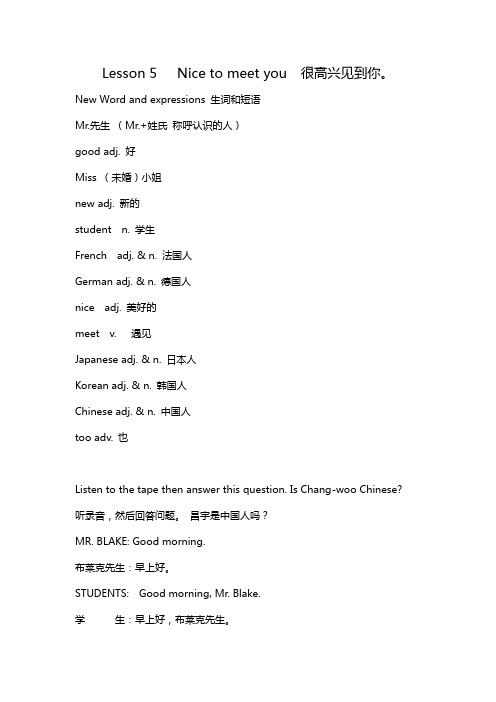
Lesson 5 Nice to meet you 很高兴见到你。
New Word and expressions 生词和短语Mr.先生(Mr.+姓氏称呼认识的人)good adj. 好Miss (未婚)小姐new adj. 新的student n. 学生French adj. & n. 法国人German adj. & n. 德国人nice adj. 美好的meet v. 遇见Japanese adj. & n. 日本人Korean adj. & n. 韩国人Chinese adj. & n. 中国人too adv. 也Listen to the tape then answer this question. Is Chang-woo Chinese? 听录音,然后回答问题。
昌宇是中国人吗?MR. BLAKE: Good morning.布莱克先生:早上好。
STUDENTS: Good morning, Mr. Blake.学生:早上好,布莱克先生。
MR. BLAKE: This is Miss Sophie Dupont.布莱克先生:这位是索菲娅.杜邦小姐。
Sophie is a new student.索菲娅是个新学生。
She is French.她是法国人。
MR. BLAKE: Sophie, this is Hans.布莱克先生:索菲娅,这位是汉斯。
He is German.他是德国人。
HANS: Nice to meet you.汉斯:很高兴见到你。
MR. BLAKE: And this is Naoko.布莱克先生:这位是直子。
She's Japanese.她是日本人。
NAOKO: Nice to meet you.直子:很高兴见到你。
MR. BLAKE: And this is Chang-woo.布莱克先生:这位是昌宇。
He's Korean.他是韩国人。
新概念英语第一册第5课_课件
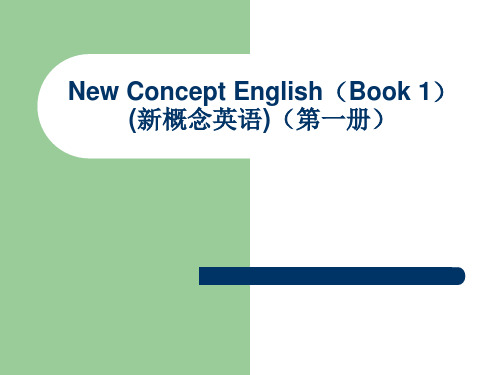
Lesson 5 Vocabulary
morning afternoon evening 晚上 night 夜里
Good morning. Good afternoon. Good evening. Good night. in the morning in the afternoon in the evening at night
Text
索菲娅 Sophie 索菲娅小姐 Miss Sophie 索菲娅小姐是个新学生。 Miss Sophie is a new student. 她是一个新学生。 She is a new student. 她不是一个新学生。 She is not a new student. 她是一个新学生吗?
and
And this is Naoko. and用在句首表示转折
Learn for fun
Tongue Twister (绕口令) Peter Piper picked a peck of pickled peppers prepared by his parents and put them in a big paper plate. Note: 1. a peck of :许多,大量的 2. pickled:腌制的 3. pepper:辣椒
Sophia
n. 1. [女子名] 索菲娅。来源于希腊语,含义是 “智慧”(wisdom)
Is she a new student? 索菲娅小姐是一个法国的女孩。 Miss Sophie is a French girl. 索菲娅小姐是一个法国人。 Miss Sophie is a French. 她是法国人。 She is (a) French. 美好的 nice 见到你很高兴。 Nice to meet you. 遇见 meet
新概念英语第5课课件

13 、Chinese [ˌt ʃai'ni:z]adj.& n. 中国人
China [ˌt ʃaɪnə] 中国
14 、too [tu:] adv. 也 too:用在肯定句和疑问句中, either:用在否定句中。 too 和either 一般放在句末,并用逗号隔开。
Lesson 5
Lesson 5 Nice to meet you.
Time is money.
—— 一寸光阴,一寸金。N Nhomakorabeaw words 生词和短语
1、 Mr.[‘mistə]先生
①不可单独使用,后加姓。②无尊敬之意
Mr. Right
白马王子
2 、good [gud] adj. 好(品质好)
3 、morning [‘mɔ:niŋ] n.早晨,上午 Good morning 早晨好,上午好 4 、 Miss [mis]小姐 Mrs. [ 'misiz ]太太 (已婚) Mrs. Black 布莱克太太 Ms. [miz]女士 Ms. Li 李女士
5 、 new [nju:] adj.新的 反义词old That is my new shirt. Is this your old dress?
New Year’s Day
元旦 新来者
New comer
6 、student ['stju:dənt]n. 学生 7 、 French [frentʃ] adj.& n. 法国人 France [fra:ns] 法国 Guess ① French window 落地窗户
French chalk
滑石粉
滑石粉为白色或类白色、微细、无砂性 的粉末,手摸有油腻感。无臭,无味。本 品在水、稀矿酸或稀氢氧化碱溶液中均不 溶解。可作药用。
新概念第一册Lessons51-60课课练答案

Lessons 51-52二、填写单词所缺字母1、October 6、climate2、spring 7、pleasant3、December 8、autumn4、winter 9、February5、summer 10、weather三、根据句意和首写字母完成下列句子1、It’s always warm in April and May, but it rains sometimes.2、It’s often cold in December, January and February. It snows sometimes.3、They’re English. They come from England.4、He’s Greek. He comes from Greece.5、We’re French. We come from France.6、She’s Dutch. She comes from Holland.7、You’re German. You’re from Germany.8、I’m Norwegian. I come from Norway.9、They’re Swedish. They come from Sweden.10、He’s Spanish. He comes from Spain..四、用所给词的适当形式填空1、We like (like) English very much.2、Jim comes (come) from England.3、Does she want (want) any meat?4、They don’t come (come) from Japan.5、It doesn’t rain (rain) in winter.6、Can you see (see) some birds in the sky?7、He is sitting (sit) on the grass.8、Can you make (make) biscuits?9、Are they working (work) hard?10、She isn’t reading (read) a magazine.五、改错1、Do you want milk and coffee?and——or2、I don’t like steak, too.too——either3、My brother like beef.like——likes4、To telling you the truth, he doesn’t like chicken.telling——tell5、It don’t rain in winter.don’t——doesn’t6、Do he come from England?Do——Does7、-What does it like in summer?-It’s hot.does——is8、Is it cold and warm in autumn?and——or9、She doesn’t likes the winter.likes——like10、I comes from China.comes——come六、完成句子1、春天的天气怎么样?What is the weather like in spring?2、他也不喜欢牛肉。
新概念英语第一册Lessons1--143课文(精排版)

Lesson1: Excuse me!Excuse me!Yes?Is this your handbag?Pardon?Is this your handbag?Yes, it is.Thank you very much.Lesson 3:Sorry sir.My coat and my umbrella please. Here is my ticket.Thank you sir.Number five.Here is your umbrella and your coat. This is not my umbrella.Sorry sir.Is this your umbrella?No, it isn't.Is this it?Yes, it is.Thank you very much.Lesson 5: Nice to meet you.Good morning.Good morning, Mr. Blake.This is Miss Sophie Dupont.Sophie is a new student.She is a French.Sophie, this is Hans.He is German.Nice to meet you.And this is Naoko.She’s Japanese.Nice to meet you.And this is Chang-woo.He’s Korean. (朝鲜人)Nice to meet you.And this is Luming.He’s Chinese.Nice to meet you.And this is Xiaohui.She’s Chinese, too.Nice to meet you.Lesson 7: Are you a teacher? I’m a new student.My name’s Robert.Nice to meet you.My name’s Sophie.Are you French?Yes, I’m.Are you French, too?N o, I’m not.What nationality are you? I’m Italian.Are you a teacher?No, I’m not.What’s your job?I’m a keyboard operator. What’s your job?I’m an engineer.Lesson 9: How are you today? Hello, Helen.Hi, Steven.How are you today?I’m very well, Thank you. And you?I’m fine, thanks.How is Tony?He’s fine, Thanks.How’s Emma?She’s very well, too, Helen. Goodbye, Helen.Nice to see you.Nice to see you, too, Steven. Goodbye.Lesson 11: Is this your shirt? Whose shirt is that?Is this your shirt, Dave?No, sir.It’s not my shirt.This is my shirt.My shirt is blue.Is this shirt Tim’s?Perhaps it is, sir.Tim’s shirt is white.Tim!Yes, sir.Is this your shirt?Yes, Sir.Here you are.Catch.Thank you, sir.Lesson 13: A new dressWhat color is your new dress?It is green.Come upstairs and see it. Thanks you.Look!Here it is!That’s a nice dress.It’s very smart.My hat’s new, too.What color is it?It’s the same color.It’s g reen, too.That’s a lovely hat.Lesson 15: Your passport, please. Are you Swedish?No, we are not.We are Danish.Are your friends Danish, too? No, they aren’t.They are Norwegian.Your passport, please.Here they are.Are there your cases?No, they aren’t.Our cases are brown.Here they are.Are you tourists?Yes, we are.Are your friends tourists too?Yes, they are.That’s fine.Thank you very much.Lesson 17: How do you doCome and meet our employees, Mr. Richards. Thank you, Mr. Jackson.This is Nicola Grey, and this is Claire Taylor. How do you do?Those women are very hard-working.What are their jobs?They’re keyboard operators.This is Michael Baker, and this is Jeremy Short. How do you do?They aren’t very busy!What are their jobs?They’re sales reps.They are very lazy.Who is this young man?This is Jim.He is our office assistant.Lesson 19: Tired and thirstyWhat’s the mater, children?We are tired and thirsty, Mum.Sit down here.Are you all right now?No, we aren’t.Look!There’s an ice cream man.Two ice creams please.Here you are, children.Thanks, Mum.These ice creams are nice.Are you all right now?Yes, we are, thank you.Lesson 21: Which book?Give me a book please, Jane.Which book?This one?No, not that one. The red one.This one?Yes, please.Here you are.Thank you.Lesson 23: Which glasses?Give me some glasses please, Jane. Which glasses?These glasses.No, not those. The ones on the shelf. These?Yes, please.Here you are.Thanks.Lesson25: Mrs. Smith’s kitchenMrs. Smith’s kitchen is small.There is a refrigerator in the kitchen.The refrigerator is white.It is on the right.There is an electric cooker in the kitchen. The cooker is blue.It is on the left.There is a table in the middle of the room. There is a bottle on the table.The bottle is empty.There is a cup on the table, too.The cup is clean.Lesson 27: Mrs. Smith’s living roomMrs. Smith’s living room is large.There is a television in the room.The television is near the window.There are some magazines on the television. There is a table in the room.There are some newspapers on the table.There are some armchairs in the room.The armchairs are near the table.There is a stereo in the room.The stereo is near the door.There are some books on the stereo.There are some pictures in the room.The pictures are on the wall.Lesson 29: Come in, Amy.Come in, Amy.Shut the door, please.This bedroom is very untidy.What must I do, Mrs. Jones?Open the window and air the room.Then put these clothes in the wardrobe.(衣橱)Then make the bed.Dust the dressing table.Then sweep the floor.Lesson31: Where’s Sally?Where’s Sally, Jack?She’s in the garden, Jane.What’s she doing?She’s sitting under the tree.Is Tim in the garden, too?Yes, he is.He’s climbing the tree.I beg your pardon?Who’s climbing the tree.Tim is.What about the dog?The dog’s in the garden, too.It’s running across the grass.It’s running after a cat.Lesson 33: A fine dayIt’s a fine day today.There are some clouds in the sky, but the sun is shining. Mrs. Jones’s with his family.They are walking over the bridge.There are some boats on the river.Mrs. Jones and his wife are looking at them.Sally is looking at a big ship.The ship is going under the bridge.Tim is looking at an aeroplane.The aeroplane is flying over the river.Lesson 35: Our villageThis is a photograph of our village.Our village is in a valley.It is between two hills.The village is on a river.Here is another photograph of the village.My wife and I are walking alone the banks of the river. We are on the left.There is a boy in the water.He is swimming across the river.Here is another photograph.This is the school building.It is beside a park.The park is on the right.Some children are coming out of the building.Some of them are going into the park.Lesson37: Making a bookcaseYou’re working hard, George.What are you doing?I’m making a bookcase.Give me that hammer please, Dan.Which hammer.This one?No, not that one.The big one.Here you are.Thanks, Dan.What are you going to do now, George?I’m going to paint it.What colour are you going to paint it?I’m going to paint it pink.Pink!This bookcase isn’t for me.It’s for my daughter, Susan.Pink’s her favorite colour.Lesson39: Do n’t drop it!What are you going to do with that vase, Penny? I’m going to put it on this table, Sam.Don’t do that.Give it to me.What are you going to do with it?I’m going to put it here, in front of the window. Be careful.Don’t drop it!Don’t put it there, Sam.Put it here, on this shelf.There we are!It’s a lovely vase.Those flowers are lovely, too.Lesson41: Penny’s bagIs that bag heavy, Penny?Not very.Here!Put it on this chair.What’s in it?A piece of cheese.A loaf of bread.A bar of soap.A bar of chocolate.A bottle of milk.A pound of sugar.Half a pound of coffee.A quarter of a pound of tea.And a tin of tobacco.Is that tin of tobacco for me?Well, it’s certainly not for me!Lesson43: Hurry up!Can you make the tea, Sam?Yes, of course I can, Penny.Is there any water in this kettle(水壶)?Yes, there is.Where’s the tea?It’s over there, behind the teapot.Can you see it?I can see the teapot, but I can’t see the tea.There it is!It’s in front of you.Ah yes, I can see it now.Where are the cups?There are some in the cupboard(碗橱).Can you find them?Yes. Here they are.Hurry up, Sam.The kettle’s boiling.lesson45THE BOSS: Can you come here a minute please, Bob?Bob: Yes, sir?THE BOSS: Where's Miss Jones?Bob: She's next door. She's in her office, sir.THE BOSS: Can she type this letter for me? Ask her please. Bob: Yes, sir.Bob: Can you type this letter for the boss please, Miss Jones? MISS JONES: Yes, of course I can.Bob: Here you are.MISS JONES: Thank you, Bob.MISS JONES: Bob!Bob: Yes? What's the matter?MISS JONES: I can't type this letter.Miss Jones: I can't read it! The boss's handwriting is terrible! lesson47 A cup of coffeeMRS YOUNG: Do you like coffee, Mrs Price?MRS PRICE: Yes, I do.MRS YOUNG: Do you want a cup?MRS PRICE: Yes, please. Mrs Young.MRS YOUNG: Do you want any sugar?MRS PRICE: Yes, please.MRS YOUNG: Do you want any milk?MRS PRICE: No, thank you. I don't like milk in my coffee.I like black coffee.MRS YOUNG: Do you like biscuits?MRS PRICE: Yes, I do.MRS YOUNG: Do you want one?MRS PRICE: Yes, please.lesson49 At the butcher’sBUTCHER: Do you want any meat today, Mrs Bird?MRS BIRD: Yes, please.BUTCHER: This lamb's very good.MRS BIRD: I like lamb, but my husband doesn't .BUTCHER: What about some steak? This is a nice piece.MRS BIRD: Give me that piece please.BUTCHER: Do you want a chicken, Mrs Bird? They're very nice.MRS BIRD: No, thank you.MRS BIRD: My husband likes steak, but he doesn't like chicken. BUTCHER: To tell you the truth(说实在的), Mrs. Bird, I don't like chicken, either !lesson51 A pleasant climateHANS: Where do you come from?DIMITRI: I come from Greece.HANS: What's the climate like in your country?DIMITRI: It's very pleasant.Hans: What's the weather like in spring?DIMITRI: It's often windy in March. It's always warm in April and May, but it rains sometimes.HANS: What's it like in summer?DIMITRI: It's always hot in June, July and August. The sun shines every day.HANS: Is it cold or warm in autumn?DIMITRI: It's always warm in September and October. It's often cold in November and it rains sometimes.HANS: Is it very cold in winter?DIMITRI: It's often cold in December, January and February. It snows sometimes.lesson53 An interesting climateHANS: Where do you come from?JIM: I come from England.HANS: What's the climate like in your country?Jim: It's mild(温和的), but it's not always pleasant.Jim: The weather's often cold in the North and windy in the East. It's often wet in the West and sometimes warm in the South.Hans: Which seasons do you like best?Jim: I like spring and summer. The days are long and the nights are short. The sun rises early and sets late. I don't like autumn andwinter. The days are short and the nights are long. The sun riseslate and sets early. Our climate is not very good, but it's certainlyinteresting. It's our favorite subject of conversation.lesson55 The Sawyer familyThe Sawyers live at 87 King Street.In the morning, Mrs Sawyer goes to work and the children go to school. Their father takes them to school every day.Mrs Sawyer stays at home every day. She does the housework. She always eats her lunch at noon.In the afternoon, she usually sees her friends. They often drink tea together.In the evening, the children come home from school. They arrive home early.Mr Sawyer comes home from work. He arrives home late.At night, the children always do their homework. Then they go to bed. Mr Sawyer usually reads his newspaper, but sometimes he and his wife watch television.lesson57 An unusual dayIt is eight o'clock. The children go to school by car every day, but today, they are going to school on foot.It is ten o'clock. Mrs Sawyer usually stays at home in the morning, but this morning, she is going to the shops.It is four o’clock. In the afternoon, Mrs Sawyer usually drinks tea in the living-room, but this afternoon, she is drinking tea in the garden.It is six o’clock. In the evening, the children usually do their homework, but this evening, they are not doing their homework. At the moment, they are playing in the garden.It is nine o’clock, Mr. Sawyer usually reads his newspaper at night, but he is not reading his newspaper tonight. At the moment, he is reading an interesting book.lesson59 Is that all?LADY: I want some envelopes please.STATIONER: Do you want the large size, or the small size?LADY: The large size please.LADY: Have you any writing-paper(信纸)?Stationer: Yes, we do.Stationer: I haven't any small pads. I only have large ones. Do you want a pad (便签簿)?LADY: Yes, please.LADY: And I want some black ink and some glue.Stationer: A bottler of ink and a bottle of glue.LADY: And I want a large box of chalk, too.Stationer: I only have small boxes. Do you want one?LADY: No, thank you.Stationer: Is that all?LADY: That's all, thank you.Stationer: What else do you want?LADY: I want my change.lesson61MR WILLIANMS: Where's Jimmy?MRS WILLIAMS: He's in bed.MR WILLIAMS: What's the matter with him?MRS WILLIAMS: He feels ill.MR WILLIAMS: He looks ill.MRS WILLIAMS: We must call the doctor.MR WILLIAMS: Yes, we must.MR WILLIAMS: Can you remember the doctor's telephone number?MRS WILLIAMS: Yes. It's 09754.DOCTOR: Open your mouth, Jimmy. Show me your tongue. Say, 'Ah'.MR WILLIMAMS: What's the matter with him, doctor?DOCTOR: He has a bad cold, Mr Williams, so he must stay in bed for a week.MRS WILLIAMS: That's good news for Jimmy.DOCTOR: Good news? Why?MR WILLIAMS: Because he doesn't like school!lesson63 Thank you , doctor.DOCTOR: How's Jimmy today?MRS WILLIAMS: He's better , thank you, doctor.DOCTOR: Can I see him please, Mrs Williams?MRS WILLIAMS: Certainly, doctor. Come upstairs.DOCTOR: You look very well, Jimmy. You are better now, but you mustn't get up yet.You must stay in bed for another two days.DOCTOR: The boy mustn't go to school yet, Mrs Williams. And he mustn't eat rich food.Mrs Williams: Does he have a temperature, doctor?Doctor: No, he doesn’t.MRS WILLIAMS: Must he stay in bed?DOCTOR: Yes. He must remain in bed for another two days. He can get up for about two hours each day, but you must keep the room warm. DOCTOR: Where's Mr Williams this evening?MRS WILLIAMS: He's in bed, doctor.Can you see him, please? He has a bad cold, too!lesson65 Not a babyFATHER: What are you going to do this evening, Betty?Betty: I'm going to meet some friends, Dad.FATHER: You mustn't come home late. You must be home at half past ten. BETTY: I can’t get home so early, Dad.Can I have the key to the front door, please?FATHER: NO, you can't.MOTHER: Betty's eighteen years old, Tom. She's not a baby. Give her the key.She always comes home early.FATHER: Oh, all right!FATHER: Here you are. But you mustn't come home after a quarter past eleven.Do you hear?BETTY: Yes, Dad.BETTY: Thanks, Mum.MOTHER: That's all right. Goodbye. Enjoy yourself!BETTY: We always enjoy ourselves, Mum. Bye, bye.lesson67 The weekendMRS JOHNSON: Hello, Mrs Williams. Were you at the butcher's?MRS WILLIAMS: Yes. I was. Were you at the butcher’s ,too?MRS JOHNSON: No, I wasn’t. I was at the greengrocer’s. How’s Jimmy today?MRS WILLIAMS: He’s very well, thank you.MRS JOHNSON: Was he absent from school last week?MRS WILLIAMS: Yes, he was. He was absent on Monday, Tuesday,Wednesday and Thursday. How are you all keeping?(你们身体怎么样?)MRS JOHNSON: Very well, thank you. We’re going to spend three days in thecountry. We’re going to stay at my mother’s for the week-end. MRS WILLIAMS: Friday, Saturday and Sunday in the country! Aren’t you lucky!Lesson69 The car raceThere is a car race near our town every year. In 1968, there was a very big race. There were hundreds of people there. My wife and I were at the race. Our friends, Julie and Jack were there, too. You can see us in the crowd. We are standing on the left.There were twenty cars in the race. There were English cars, French cars, German cars, Italian cars, American cars and Japanese cars.It was an exciting finish. The winner was Billy Stewart. He was in car number fifteen. Five other cars were just behind him.On the way home, my wife said to me, “Don’t drive so quickly! You’re not Billy Stewart!”Lesson 71 He’s awfulJane : What’s Ron Marston like , Pauline ?Pauline : He’s awful ! He telephoned me four times yesterday , and three times the day before yesterday.Pauline: He telephoned the office yesterday morning and yesterday afternoon. My boss answered the telephone .Jane : What did your boss say to him ?Pauline: He said ,”Miss White is typing letters .She can’t speak to you now !”Pauline : Then I arrived home at six o’clock yesterday evening .He telephoned again .But I didn’t answer the phone !Jane : Did he telephone again last night ?Pauline : Yes , he did . He telephoned at nine o’clock .Jane : What did you say to him ?Pauline : I said ,”This is Pauline ‘s mother . Please don’t telephone my daughter again !”Jane : Did he telephone again ?Pauline : No , he didn’t !Lesson73 The way to King StreetLast week Mrs Mills went to London. She does not know London very well, and she lost her way.Suddenly, she saw a man near a bus-shop. “ I can ask him the way.” She sa id to herself.“Excuse me,” she said.“Can you tell me the way to King Street please?”The man smiled pleasantly. He did not understand English! He spoke German. He was a tourist.Then he put his hand into his pocket, and took out a phrase-book.He opened the book and found a phrase. He read the phrase slowly.“I am sorry,” he said. “ I do not speak English.”Lesson 75 Uncomfortable shoesLADY : Have you any shoes like these?SALESMAN: What size?Lady: Size five.Salesman: What colour?Lady: Black.Salesman: I’m sorry. We haven’t any.Lady: But my sister bought this pair last month.Salesman: Did she buy them here?Lady: No, she bought them in the U.S.Salesman: We had so me shoes like those a month ago, but we haven’t any now. Lady: Can you get a pair for me please?Salesman: I’m afraid that I can’t. They were in fashion last year and the year before last.But they’re not in fashion this year.Salesman: These shoes are in fashion now.Lady: They look very uncomfortable.Salesman: They are very uncomfortable. But women always wear uncomfortable shoes!Lesson77 Terrible toothacheNurse: Good morning, Mr Croft.Mr Croft: Good morning, nurse. I want to see the dentist, please.Nurse: Have you an appointment?(有预约吗?)Mr Croft: No, I haven’t .Nurse: Is it urgent?Mr Croft: Yes, it is . It’s very urgent. I feel awful. I have a terrible toothache. Nurse: Can you come at 10 am on Monday, April 24th?Mr Croft: I must see the dentist now, nurse.Nurse: The dentist is very busy at the moment. Can you come at 2:00 PM? Mr Croft: That’s very late. Can’t the dentist see me now?Nurse: I’m afraid that he can’t , Mr Croft. Can’t you wait till this afternoon?Mr Croft: I can wait, but my toothache can’t !Lesson79 Peggy’s shopping-listTom: What are you doing, Peggy?Peggy: I’m making a shopping-list, Tom.Tom: What do we need?Peggy: We need a lot of things this week.Peggy: I must go to the grocer’s. We haven’t got much tea or coffee, and we haven’t got any sugar or jam.Tom: What about vegetables?Peggy: I must go to the greengrocer’s. We haven’t got many tomatoes, but we’ve got a lot of potatoes.Peggy: I must go to the butcher’s, too. We need some meat. We haven’t got any meat at all.Tom: Have we got any beer and wine?Peggy: No, we haven’t. And I’m not going to get any!Tom: I hope that you’ve got some money.Peggy: I haven’t got much.Tom: Well, I haven’t got much either!Lesson81 Roast beef and potato.John: Hello, Peggy! Where’s Tom?Peggy: He’s upstairs. He’s havin g a bath.Peggy: Tom!Tom: Yes?Peggy: John’s here.Tom: I’m nearly ready.Tom: Hello, John. Have a cigarette.John: No thanks, Tom.Tom: Have a glass of whisky then.John: O.K. Thanks.Tom: Is dinner ready, Peggy?Peggy: It’s nearly ready. We can have dinner at seven o’clock.Tom: John and I had lunch together today. We went to a restaurant.Peggy: What did you have?Tom: We had roast beef and potatoes.Peggy: Oh!Tom: What’s the matter, Peggy?Peggy: Well, you’re going to have roast beef and potatoes again tonight!Lesson83 Going on a holidayPeggy: Hello, John. Come in.Tom: Hello, John. We’re having lunch. Do you want to have lunch with us? John: No thank you, Tom. I’ve already had lunch. I had lunch at half past twelve. Peggy: Have a cup of coffee then.John: I’ve just had a cup, thank you. I had one after my lunch.Tom: Let’s go into the living-room, Peggy. We can have our coffee there. Peggy: Excuse the mess, John. This room’s very untidy. We’re packing our suitcases. We’re going to leave tomorrow. Tom and I are going to have aholiday.John: Aren’t you lucky!Tom: When are you going to have a holiday, John?John: I don’t know. I’ve already had my holiday this year.Peggy: Where did you go?John: I stayed at home!Lesson85 Paris in the SpringGeorge: Hello, Ken.Ken: Hello, George.George: Have you just been to the cinema?Ken: Yes, I have.George: What’s on?Ken: “Paris in the Spring”.George: Oh, I’ve already seen it. I saw it on a B.B.C. television programme last year.It’s an old film, but it’s very good.Ken: Paris is a beautiful city.George: I have never been there. Have you ever been there, Ken?Ken: Yes, I have. I was there in April.George: Paris in the spring, eh?Ken: It was spring, but the weather was awful. It rained all the time.George: Just like dear old London!Lesson87 A car crashMr Wood: Is my car ready yet?Attendant: I don’t know, sir.What’s the licence number of your car?Mr Wood: It’s LFZ 312 G.Attendant: When did you bring it to us?Mr Wood: I bought it hear three days ago.Attendant: Ah yes, I remember now.Mr Wood: Have your mechanics finished yet?Attendant: No, they’re still working on it. Let’s go into the garage and have a look at it.Attendant: Isn’t that your car?Mr Wood: Well, it was my car.Attendant: Didn’t your wife have a crash?Mr Wood: That’s right. She drove it into a lamp post(电线杆). Can your mechanics repair it?Attendant: Well, they’re trying to repair it, sir. But to tell you the truth, you need a new car.Lesson89 For saleMr Hill: Good afternoon. I believe that this house is for sale(待售).Mr West: That’s right.Mr Hill: May I have a look at it please?Mr West: Yes, of course. Come in.Mr Hill: How long have you lived here?Mr West: I have lived here for twenty years.Mr Hill: Twenty years! That’s a long time.Mr West: Yes, I have been here since 1947.Mr Hill: Then why do you want to sell it?Mr West: Because I have just retired. I want to buy a small house in the country. Mr Hill: How much does this house cost?Mr West: £6850.Mr Hill: That’s a lot of money!Mr West: It’s worth every penny of it.Mr Hill: Well, I like the house, but I can’t decide yet. My wife must see it first. Mr West: Women always have the last word.Lesson91 Poor WestMrs Smith: Has Mr West sold his house yet?Mrs Brown: Yes, he has. He sold it last week.Mrs Smith: Has he moved to his new house yet?Mrs Brown: No, not yet. He’s still here. He’s going to move tomorrow.Mrs Smith: When? Tomorrow morning?Mrs Brown: No. Tomorrow afternoon. I’ll miss him. He has always been a good neighbour.Mrs Green: He’s a very nice person. We shall all miss him.Mrs Smith; When will the new people move into this house?Mrs Brown: I think that they will move in the day after tomorrow.Mrs Green: Will you see Mr West today, Mrs Brown?Mrs Brown: Yes, I will.Mrs Green: Please give him my regards. (give one’s regards to sb.向sb.问候)Mr Smith: Poor Mr West! He didn’t want to leave this house.Mrs Brown: No, he didn’t want to leave, but his wife did!Lesson93 Our new neighborMr Hill is our new next-door neighbour. He’s a p ilot.He was in the R.A.F.(皇家空军)He will fly to New York next month.The month after next he will fly to Tokyo.At the moment(现在), he’s in Madrid. He flew to Spain a week ago.He will return to London the week after next.He’s only forty-one years old, and he has already been to nearly every country in the world.Mr Hill is a very lucky man. But his wife isn’t very lucky. She usually stays at home!Lesson95 Ticket, please.George: Two return tickets to London please. What time will the next train leave?Attendant: At nineteen minutes past eight.George: Which platform?Attendant: Platform Two. Over the bridge.Ken: What time will the next train leave?George: At eight nineteen.Ken: We’ve got plenty of time.George: It’s only three minutes to eight.Ken: Let’s go and have a drink. There’s a bar next door to the station. George: We had better go back to the station now, Ken.Porter: Tickets please.George: We want to catch the eight nineteen to London.Porter: You’ve just missed it!George: What! It’s only eight fifteen.Porter: I’m sorry, sir. That clock’s ten minutes slow.George: When’s the n ext train?Porter: In five hours’ time!Lesson97 A small blue caseMr Hall: I left a suitcase on the train to London the other day.Attendant: Can you describe it, sir?Mr Hall: It’s a small blue case and it’s got a zip. There’s a label on the handle with my name and address on it.Attendant: Is this case yours?Mr Hall: No, that’s not mine.Attendant: What about this one? This one’s got a label.Mr Hall: Let me see it.Attendant: What’s you name and address?Mr Hall: David Hall,83, Bridge Street.Attendant: That’s right.D.N.Hall.83.Bridge Street.Attendant: Three pound and fifty pence please.Mr Hall: Here you are.Attendant: Thank you.Mr Hall: Hey!Attendant: What’s the matter?Mr Hall: This case doesn’t belong to me! You’ve given me the wrong case!Lesson99 Ow!Ted : Ow!Pat: What’s the matter, Ted?Ted: I slipped and fell downstairs.Pat: Have you hurt yourself?Ted: Yes, I have. I think that I’ve hurt my back.Pat: Try and stand up. Can you stand up?Here. Let me help you.Ted: I’m sorry, Pat. I’m afraid that I can’t get up.Pat: I think that the doctor had better see you. I’ll telephone Dr Carter. Pat: The doctor says that he will come at once. I’m sure that you need an X-ray, Ted.Lesson101 A card from JimmyGrandmother: Read Jimmy’s card to me please, Mary.Mary: “I have just arrived in Scotland and I’m staying at a Youth Hostel.”Grandmother: Eh?Mary: He says he’s just arrived in Scotland.H e says he’s staying at a Youth Hostel.You know he’s a member of the Y.H.A.Grandmother: The what?Mary: The Y.H.A., mother. The Youth Hostel’s Association. Grandmother: What else does he say?Mary: “I’ll write a letter soon. I hope you are all well.”Grandmother: What? Speak up, Mary. I’m afraid I can’t hear you.Mary: He says he’ll write a letter soon. He hopes we are all well. “ Love, Jimmy.”Grandmother: Is that all? He doesn’t say very much, does he?Mary: He can’t write very much on a card, mother.Lesson103 The Intelligence testHarry: How was the examination, Dick?Dick: Not too bad. I think I passed in English and Mathematics. The questions were very easy. How about you, Harry?Harry: The English and Maths papers weren’t easy enough for me. I hope I haven’t failed.。
新概念英语一册第五课知识点总结
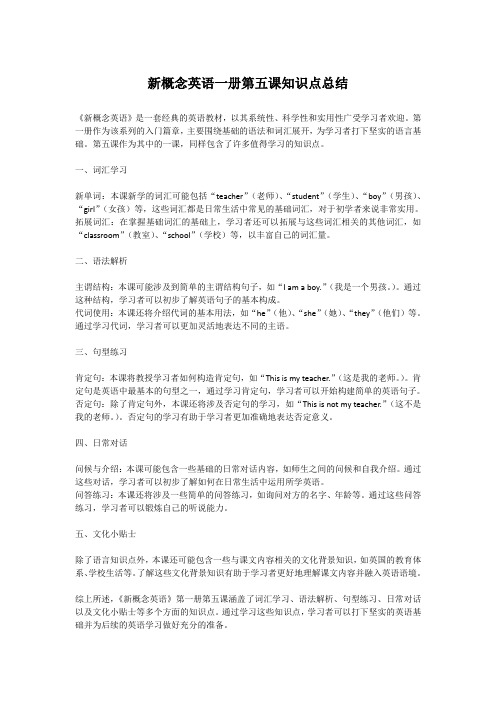
新概念英语一册第五课知识点总结《新概念英语》是一套经典的英语教材,以其系统性、科学性和实用性广受学习者欢迎。
第一册作为该系列的入门篇章,主要围绕基础的语法和词汇展开,为学习者打下坚实的语言基础。
第五课作为其中的一课,同样包含了许多值得学习的知识点。
一、词汇学习新单词:本课新学的词汇可能包括“teacher”(老师)、“student”(学生)、“boy”(男孩)、“girl”(女孩)等,这些词汇都是日常生活中常见的基础词汇,对于初学者来说非常实用。
拓展词汇:在掌握基础词汇的基础上,学习者还可以拓展与这些词汇相关的其他词汇,如“classroom”(教室)、“school”(学校)等,以丰富自己的词汇量。
二、语法解析主谓结构:本课可能涉及到简单的主谓结构句子,如“I am a boy.”(我是一个男孩。
)。
通过这种结构,学习者可以初步了解英语句子的基本构成。
代词使用:本课还将介绍代词的基本用法,如“he”(他)、“she”(她)、“they”(他们)等。
通过学习代词,学习者可以更加灵活地表达不同的主语。
三、句型练习肯定句:本课将教授学习者如何构造肯定句,如“This is my teacher.”(这是我的老师。
)。
肯定句是英语中最基本的句型之一,通过学习肯定句,学习者可以开始构建简单的英语句子。
否定句:除了肯定句外,本课还将涉及否定句的学习,如“This is not my teacher.”(这不是我的老师。
)。
否定句的学习有助于学习者更加准确地表达否定意义。
四、日常对话问候与介绍:本课可能包含一些基础的日常对话内容,如师生之间的问候和自我介绍。
通过这些对话,学习者可以初步了解如何在日常生活中运用所学英语。
问答练习:本课还将涉及一些简单的问答练习,如询问对方的名字、年龄等。
通过这些问答练习,学习者可以锻炼自己的听说能力。
五、文化小贴士除了语言知识点外,本课还可能包含一些与课文内容相关的文化背景知识,如英国的教育体系、学校生活等。
lesson5 朗文 新概念靑少版3A

How long is your day?Part I : Reading and understandingListen to the recording, and complete the Questionaire.听录音, 然后完成调查问卷。
‘Have you finished your homework yet?’‘Why haven ’t you finished your homework?’How often do you hear these questions inyour house? How do you feel about homework?Children worldwide now do more Homework hours than they did tenty-five years ago-but there are huge variations. In s some parts of the world, even very young children have a lot of homework. Theycome home from school, and they workfor three or four hours before bedtime. In other parts of the world, children don ’thave much homework until they are a bit older.At the same time, many young peopleWorldwide have extra classes after school.One way or another, many children ‘work ’Twelve or fourteen hours a day. Is this reallyNecessary?How much homework do you have?How much time do you spend on it?How long is your day?Unit 5Questionnaire Answersa, b, or c1 My homework usually takes me________ a day.a) less than an hour b) about two hours.c) three hours or more2 Every morning, I have homework in _______ subjects.a) one or two b) three or fourc) five or more3 I can usually do ______ my homework at school.a) most of b) about half ofc) none of4 I usually have _______ free day each week.a) more than one b) onec) less than one5 During the past week, I have spent ______ hours on my homework.a) up to ten b) between ten and fifteenc) more than fifteen6 Sometimes, I don’t do all my homework.a) but my teachers don’t mind b) and my teachers get annoyed with mec) and my parents hear about it.Part II : wordsworldwide adv.(place) 在全世界huge adj. 巨大的variation n.变化bedtime n.就寝时间subject n.科目necessary adj.必要的,必需的questionnaire n.调查问卷free adj. 自由的during prep.在……期间past adj.过去的up to prep.(+ number) 多达annoyed adj.恼怒的,生气的choose v. 选择add v. 增加one way or another 以这样或那样的方式Part III: speakingPatterns:a): When are you going to paint the door?b): I’ve already painted it.c): Really? When did you do it?35 36Robert LucyPainted the door corrected her composition (this morning) (before supper)37 38Nina SallyLooked at those photos washed the windows ( after lunch) (an hour ago)39 Willian and Karen 40 Polly and AnnieCleaned the car listened to that new CD(this morning) (this afternoon)41 Vikki 42 Paul and Clairefinished her homework watched that old film(half an houe ago) (early this morning)ExercisesI. Answer questions about text.a)Example: Children do more hoework now than they did twenty-fiveyears ago, don’t they? Yes, they do.1.But there are huge variations, aren’t there?____________________________________________________________ 2.In some parts of the world, even very young children have a lot ofhomework, don’t they?3.Some children work for three or four hours before bedtime, don’t they? ____________________________________________________________4.In some parts of the world, children don’t have much homework, dothey?____________________________________________________________ 5.And some children have extra classes after school, don’t they?____________________________________________________________II. Complete these sentences, using the notes in bracket. Then look at the text in Lesson 9.1.How often …….( hear/ questions/ your house?)____________________________________________________________ 2.Children worldwide……(more homework hours/ twenty-five years ago/but / huge variation)____________________________________________________________ 3.They come home…….(school/ work/ three or four hours/ bedtime)____________________________________________________________ 4.In other parts…….(world/ don’t have/ homework until/ a bit older)____________________________________________________________III. Write complete answers to these questions about part of the text in Lesson 9, to make a paragraph.1.Where do children do more homework hours now than they didtwenty-five years ago? Are there small or huge variations? (……but……)2.Where do even very young children have a lot of homework?3.Where do they come home from? How long do they work beforebedtime? (…….and……)4.Where do many young people in the world have extra classes too?5.How many hours a day do many children ‘work’? (so…….)________________________________________________________________________________________________________________________ ____________________________________________________________ ____________________________________________________________IV. Listen to the recording, and answer the questions about the text.Dinosaurs’ blood1.Robert asks William, ‘What kind of blood?’What is the real question?____________________________________________________________ 2.What’s the answer?____________________________________________________________ 3.What kind of blood did small dinosaurs have?____________________________________________________________ 4.What kind of blood did big dinosaurs have?____________________________________________________________ 5.How does Robert know about this?____________________________________________________________V. Match the questions.( )1. How long does your homework usually take you?( )2. Where’s Peter?( )3. Why haven’t you finished your homework yet?( )4. What’s Karen doing?( )5. Where have the children been?( )6. Has he cleaned the car yet?A.No, he hasn’t cleaned it yet.B.Because it’s very difficult.C.He’s gone abroad, I think.D.She’s writing some emails.E.About two hours every evening.F.In the garden.VI. Choose the best answers.1.My homework usually______ me less than an hour a day.a) spends b) needs c) takes d) lasts2. Every evening, I have homework in three or four ________.a) classes b)subjects c) hours d) lessons3. I can usually do most of my homework_____ school.a) to b) at c) into d) on4. I usually _____ one free day each week.a) do b) give c) spend d) have5. During the past week, I have____ up to ten hours on my homework.a) been b) gone c) lasted d) spent6. Sometimes I don’t do all my homework and my teachers_____annoyed with me.a) be b) get c) have d) finish。
新概念英语Lesson5
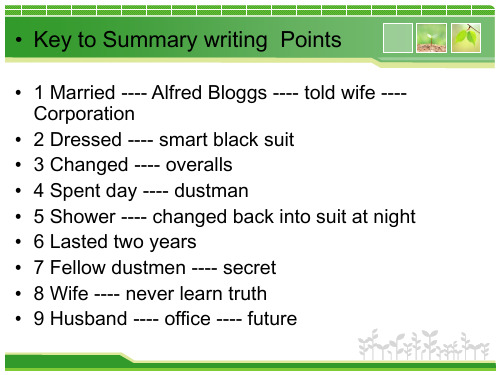
4. The journalist immediately set out to obtain these important facts… . (1) set out to do 解释:开始做..,着手做… eg. The vicar set out to raise money to repair the clock. 同义短语:set out about doing
editor
edit editorial edition
adj.编辑的 n.社论
provide sb. with sth. (1)解释:为某人提供某物 eg. Many companies and organizations have provided the victims in the disaster area with food and medicine. (2)同义: provide sb with sth offer sth to sb supply sth for sb
6. Not only had the poor man been
arrested, but he had been sent to prison as well. 部分倒装结构: 条件: 特殊成分提句首, 否定只有一样so, 祝愿虚拟让步 though, 从句倒装主保留。
• 我绝对不嫁给你。 • Never will I marry you. • 我很少见到他。 • I seldom see him. • = Seldom do I see him.
• 骆驼经常被称为是沙漠之舟,因为他们对 旅行者很重要. • Camels are frequently referred to as the boats in the desert for the simple reason that they are essential to the travelers. • 这是大自然的法则:适者生存。
新概念一册上lessons 5-8

➢ MR. BLAKE: Sophie, this is Hans.
He is German.
• German adj. & n. 德国人/德语 • Germans复数 Germany德国
➢ HANS: Nice to meet you.
Hamburg, Germany
➢ MR. BLAKE: And this is Naoko. She's Japanese.
what adj. & pron. 什么,构成特殊疑问句 特殊疑问句 1、结构:特殊疑问词+一般疑问句的结构 特殊疑问词有哪些?
如:who , what , which , whom, whose , where , why , when,how
2、回答:不用yes/no,必须有具体内容
➢ROBERT: Are you a teacher?
MR. BLAKE: This is Miss Sophie Dupont. Sophie is a new student. She is French.
➢ 介绍别人时即使知道对方性别也不会说 ● He is…She is… 而是This is…
➢ new 新的 old 旧的 ● News(= north + east + west + south) 新闻
Japanese adj. & n. 日本人, Japan 日本
➢ NAOKO: Nice to meet you.
Seoul, South Korea
➢ MR. BLAKE: And this is Chang-woo. He’s Korean. • South Korea 韩国 North Korea 朝鲜 • Korean\ south Korean adj&n. 韩国人 ➢ CHANG-WOO: Nice to meet you. ➢ MR. BLAKE: And this is Luming.He is Chinese. • Chinese adj. & n. 中国人/汉语 China 中国 Beijing
新概念第二册摘要写作参考答案(Lessons5)
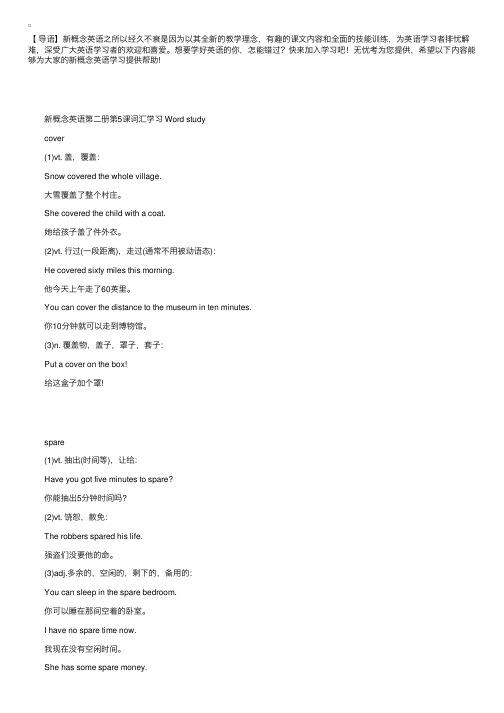
【导语】新概念英语之所以经久不衰是因为以其全新的教学理念,有趣的课⽂内容和全⾯的技能训练,为英语学习者排忧解难,深受⼴⼤英语学习者的欢迎和喜爱。
想要学好英语的你,怎能错过?快来加⼊学习吧!⽆忧考为您提供,希望以下内容能够为⼤家的新概念英语学习提供帮助! 新概念英语第⼆册第5课词汇学习 Word study cover (1)vt. 盖,覆盖: Snow covered the whole village. ⼤雪覆盖了整个村庄。
She covered the child with a coat. 她给孩⼦盖了件外⾐。
(2)vt. ⾏过(⼀段距离),⾛过(通常不⽤被动语态): He covered sixty miles this morning. 他今天上午⾛了60英⾥。
You can cover the distance to the museum in ten minutes. 你10分钟就可以⾛到博物馆。
(3)n. 覆盖物,盖⼦,罩⼦,套⼦: Put a cover on the box! 给这盒⼦加个罩! spare (1)vt. 抽出(时间等),让给: Have you got five minutes to spare? 你能抽出5分钟时间吗? (2)vt. 饶恕,赦免: The robbers spared his life. 强盗们没要他的命。
(3)adj.多余的,空闲的,剩下的,备⽤的: You can sleep in the spare bedroom. 你可以睡在那间空着的卧室。
I have no spare time now. 我现在没有空闲时间。
She has some spare money. 她有⼀些活钱。
Where can I get spare parts for this machine? 我从哪⾥可以找到这台机器的备件? 新概念英语第⼆册第5课练习答案 Key to written exercises 1.关键句型练习答案 A What happened: carried (1.4 ) ; covered (1. 5 ) What has happened: has just bought (1.1) ; has just bought (11.3-4);has sent(1.6);has begun(1.8) C 1 What did you buy … ? 2 he has never lent … 3 Have you burnt … ? 4 He fought … 5 They have already left . 6 When did you lose … ? 7 Did you listen … ? 8 We have just won … 2.难点练习答案 A 1 On the way 2 in the way 3 By the way 4 in this/a way 5 in the way B 1 There is a spare wheel in the back of the car. 2 I always go on excursions in my spare time. 3 'Have you any old clothes to spare? 'he asked. 4 The guest slept in our spare room. 5 'Spare me!'begged the prisoner. 3.多项选择题答案 1c 2a 3d 4b 5c 6d 7a 8b 9c 10b 11a 12d。
新概念英语第五课.ppt
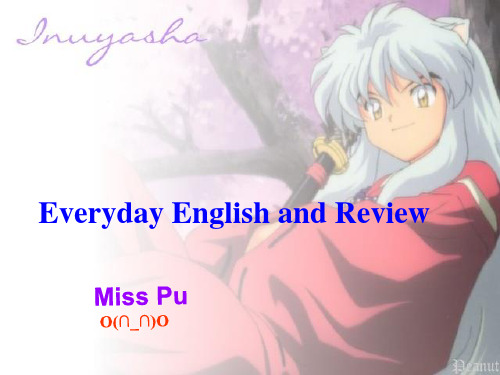
MAN: No, not that one. The red one. 丈夫:不,不是那本。是那本红皮的。
WOMAN: This one? 妻子:这本吗?
MAN: Yes, please. 丈夫:是的,请给我。
WOMAN: Here you are. MAN: Thank you.
妻子:给你。 丈夫:谢谢。
?thebookonthedesk?在英语中形容词修饰名词时修饰成份放在名词前面但由一个介词短语或句子修饰名词时这个修饰成份应放在名词的后面
Everyday English and Review
New lesson
—— Which glasses? 哪几只杯子?
Language Points
Hale Waihona Puke New words and expressions 生 词
give
v. 给
one
pron.一个
which
哪一个
on
prep.在……之上
shelf
n. 架子,搁板
MAN: Give me a book please, Jane. 丈夫: 请拿本书给我,简。
WOMAN: Which book? 妻子: 哪一本?
WOMAN: This one? 妻子: 是这本吗?
MAN: Give me some glasses please, Jane. 丈夫: 请拿给我几只玻璃杯,简。
WOMAN: Which glasses? 妻子:哪几只?
WOMAN: These glasses? 妻子:这几只吗?
MAN: No, not those. The ones on the shelf. 丈夫:不,不是那几只。是架子上的那几只。
新概念第一册自学导读Lessons5-6

新概念第一册自学导读 Lessons5-6课文详注 Further notes on the text1. Good morning .早上好。
英语中常见的问候用句。
对此问候的回应一般也是 Good morning 。
根据一天中见面时间的不同还能够说 Good afternoon (下午好)和 Good evening (晚上好)。
有时英美人见面时只简单地说一声 Hello 。
2. This is Miss Sophie Dupont .这位是索菲娅•杜邦小姐。
This is 姓名是将某人介绍给他人时常用的句式。
课文中的例子 还有: Sophie, this is Hans.索菲娅,这位是汉斯。
And this is Naoko.这位是直子。
3. Mr . Blake /Miss Sophie Dupont ,布莱克先生/索菲娅•杜 邦 小姐。
在一般情况下,不用中间名。
在熟悉的人中间, 正式的场合中常用Mr .(先生),Mrs .(太太) Ms.(女士)这些称呼再加上姓。
Mr .用于男士的姓之前,不能单独使用,如课文中的Mr . Blake ;而 sir 一般单独使用,是对长者、上司或男顾客的尊称,如: Sorry, sir.对不起,先生。
英语国家中人的姓名通常由 3 部分组成,即:名 中间名 姓。
以名相称,而在 , Miss (小姐)或Miss 一般用于指未婚女子,不过有时在不知道对方是否已婚时也可使用。
4.Nice to meet you .很高兴见到你。
用于初次与他人见面等非正式场合。
对方的回应一般应为Nice to meet you ,too (我也很高兴见到你)。
人们在正式的场合初次见面时常用:How do you do ?相对应的回答也是:How do you do ?这是一句问候语,并非问话。
5.国籍与国家名称有别请不要将国家名称和与其对应的国籍搞混。
课文的French ,German,Japanese,Korean 以及Chinese 都是表示国籍的词。
- 1、下载文档前请自行甄别文档内容的完整性,平台不提供额外的编辑、内容补充、找答案等附加服务。
- 2、"仅部分预览"的文档,不可在线预览部分如存在完整性等问题,可反馈申请退款(可完整预览的文档不适用该条件!)。
- 3、如文档侵犯您的权益,请联系客服反馈,我们会尽快为您处理(人工客服工作时间:9:00-18:30)。
Lessons 5 Nice to meet you.
【New words】
1.Mr. 先生
Mr.用于男士的姓之前,不能单独使用。
e.g. Mr. Blake 布莱克先生
Mr. Green 格林先生
比较:sir一般单独使用,是对长者、上司以及男顾客的尊称。
例如:Sorry, sir. 对不起,先生。
2.Miss 小姐
一般用于指未婚女子,或者用于不知道对方是否已婚。
e.g. Miss Chen 陈小姐
3.good adj.好
e.g. a good boy/girl 一个好男生/女生
4. morning n.早晨
e.g. Good morning. 早上好。
Good afternoon. 下午好。
Good evening. 晚上好。
Goodbye. 再见。
Good night. 晚安。
Good luck! 好运!
5.new adj.新的
e.g. a new student 一位新生
a new house 一栋新房子
反义词:old 旧的
6. student adj.学生
e.g. a good student 一位好学生
teacher 老师
7. nice adj.美好的,友好的
e.g. a nice dress 一件漂亮的裙子
You are nice. 你很友好。
8.meet v.遇见
e.g. Nice to meet you. 很高兴见到你。
Let’s meet tomorrow. 我们明天见。
9.too adv.也(用于肯定句和疑问句中,置于句末)
e.g. (1)I am a student. He is a student, too.
我是个学生。
他也是个学生。
(2)Are you a student, too?
你也是名学生吗?
在否定句中用“either”表示“也”,置于句末。
e.g. I am not French, either. 我也不是法国人。
10.France 法国French 法国的;法国人
Germany 德国German 德国的;德国人
Japan 日本Japanese 日本的;日本人
Korea 韩国Korean 韩国的;韩国人
China 中国Chinese 中国的;中国人
【Language points】
1.介绍他人
构成:This is+姓名这是......
英语中,把一个人介绍给别人时,即便知道这个人的性别,也不用He/She is...,而是用This is...
课文应用:This is Miss Sophie Dupont.
这位是索菲亚·杜邦小姐。
2.讨论国籍时:
课文应用:She is French. 她是法国人。
英语中,表示国籍的名词前通常没有冠词。
He/She is + 国籍
e.g. He is German. 他是德国人。
She is Japanese. 她是日本人。
3.问候语
Nice to meet you. 很高兴见到你。
(1)一般在双方刚刚认识后说这句话,表示很高兴认识对方。
翻译为“初次见到你很高兴”。
回答通常是:Nice to meet you, too.见到你我也很高兴。
(2)此外,两位熟人或朋友见面,也常用此句子表示问候。
这句话还可以说成:
Nice to see you.
Glad to meet you.
4.And this is Hans.这位是汉斯。
And在本句中不是“和”、“又”的意思,它是一个转折词,没有任何意思。
e.g. I am a student, and my sisiter is a teacher.
我是一名学生,我姐姐是一名老师。
